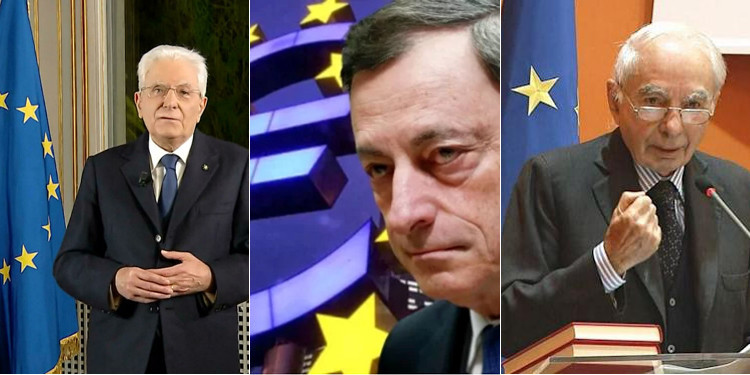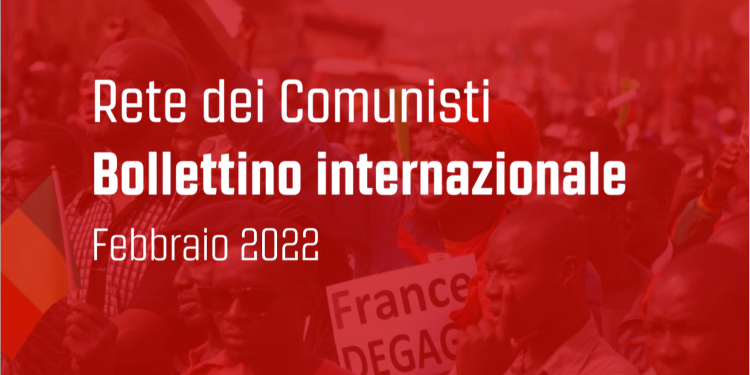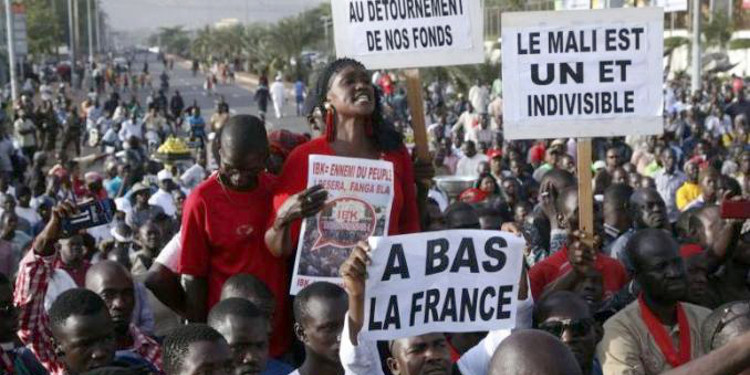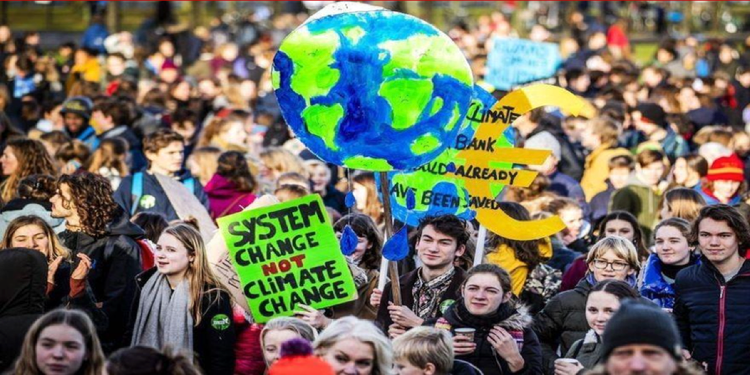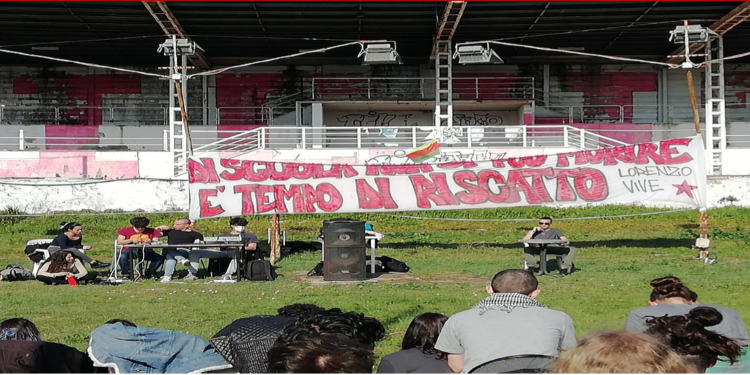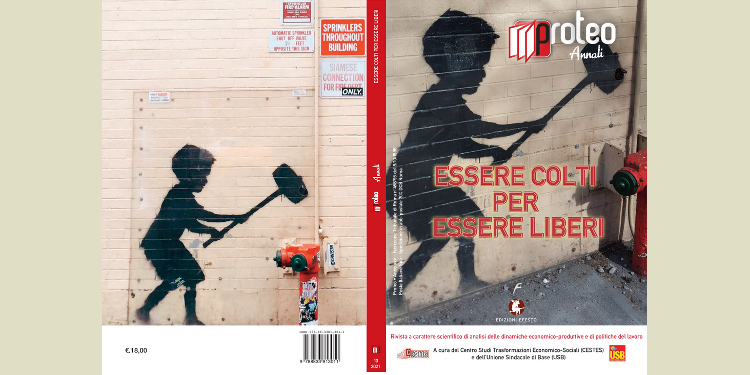| english | español | français | italiano |
Editorial RdC
The passage of the re-election of the President of the Republic has brought to light the real condition of political and institutional representation in our country, which is increasingly degraded politically and culturally, much worse than it was in the first Christian Democrat republic and the second Berlusconian republic.
It has been clear for some time that things were like this – much worse than they appeared to be – but the political omertà of the parties, starting with the Lega and M5S, and the servility of the mass media have somehow obscured this reality to most people.
Three governments in one legislature, the involvement of the “saviour of the country” Mario Draghi, the same Christian Democrat wisdom/hypocrisy of Mattarella (we have a political theatre in which there is a great revival of Christian Democrats), have led to the crisis and suicide of a party system in which the so-called poles have reached the point of disintegration, for now politically and in the coming months we will see if also organisational, with splits and various reorganisations.
The centre-right, always first in the polls, is shaken by at least two irremediable contradictions. The first is the electoral competition between Salvini and Meloni, which prevents stable agreements from being made.
The second is much more serious and concerns the choices to be made on the European Union, which certainly splits the League internally, with Giorgetti playing the ‘moderate pro-European’, but also affects the other formations, albeit in more subdued tones.
In short, the centre-right is on the verge of a nervous breakdown, perhaps preparatory to a division of those forces.
In the Centre-Left, while the PD is holding its own – albeit in its ability to represent only the country’s middle and upper middle classes – the M5S, an anomalous phenomenon that has been present on the institutional scene for ten years, is working hard on its own decline.
Of course, if we have arrived at this point, it is not because the politicians are all incapable or stupid, even if there is some doubt about Salvini, but it has two consistent material reasons.
The first is the fragmentation of society and of the Italian production model, produced by the choices made over the last thirty years, particularly by the centre-left.
These have generated a strategically weak economic development (“small is beautiful”), privatised at the expense of the state, fragmented, substantially subordinate and complementary to the productive structure of central Europe.
To this structural condition, moreover, must be added the passivity of the class sectors, today ideologically subordinate. All this makes it easy to foresee the chaotic prospects that will arise in this last part of the legislature.
The other cause is the increasingly pervasive role of the EU within individual countries and in various productive and social spheres on which, with the PNRR, it is preparing to make a further centralising squeeze in function only of the global competition that is subjecting the whole world to pressures that change the general conditions.
In Italy this means a change and a hierarchisation to which politics and the party world must be subjected, also thanks to the fact that about half of the PNRR used is to be paid back as debt and not “non-repayable”.
Simplifying, we can say that the process – underway for some time – of overturning the country’s political decision-making and institutional processes and the principles of the Italian Constitution is coming to an end
While before the ‘government of the nation’ was formally based on an internal party and ‘pyramidal’ structure of political power, which unravelled from Parliament towards the top of the State, today this condition is being overcome with the disbandment of its components, see the weight of the ‘mixed group’ and the internal fractures within the parties and poles, and with its consequent impotence.
All this has taken place while the official rhetoric tells us instead that the election of Mattarella as president of the republic is the “recovery” of that decision-making power.
What is being affirmed in deeds and actions is a “verticalisation” of decision-making power in which Mattarella as President of the Republic, Draghi as Prime Minister and Amato as President of the Constitutional Court (an election passed over in silence) are the terminals of a supranational power – the European Union – to which national institutions and parties are literally “hanging”, and which will have less and less room for manoeuvre because “Europe is asking us to”.
In short, the process of integration within a supranational dimension is proceeding step by step, but inexorably.
Certainly the political forces more closely linked to the national dimension – in particular the centre-right, but also the M5S – will try to oppose this dragging, perhaps by putting a spoke in the wheel of the Draghi government and trying to make it fall, but all this seems more like the wiggling of someone who has fallen into quicksand, and who the more he wiggles the more he sinks.
It is clear that the effect of the maturing of this condition is to open up a political space and widen the gap between the ‘citizens’ – that is, the world of work and the weaker social sectors – and the institutions.
But the problem that now arises is who will occupy this space, given that in politics no space remains uncovered for too long.
And here we come to the question that directly concerns the class, political and social forces, and the communists. Undoubtedly we can say, using popular wisdom, that today “we have bread but no teeth”.
In other words, if the ‘objective conditions’ are becoming more and more favourable to a potential political and social conflict, the subjective and organisational conditions that would allow us to cover that space are absolutely lacking
It is on this point, therefore, that it is necessary to focus and work with these perspectives and some signals that are coming from reality.
First of all, a widespread conflict in the world of work and production, from ports to logistics to factories in crisis, resulting from the European restructuring processes, which are only just beginning, and which the confederal unions are barely trying to contain, see the last useless and farcical general strike of 16 December.
We can say that the class struggle from below is beginning to reappear, given that up to now only the struggle from above has acted, and that the inflationary processes that are in prospect will give it a further boost.
The other important element is the manifestation and continuation of the important student mobilisation, which has been going on since October 2021, which has put the government in difficulty with the affair of the Minister of the Interior Lamorgese, who has obtusely repressed students protesting against deaths at work, as happened to the student Lorenzo Parelli while he was working for free for the “alternating school-work”.
It should be remembered, however, that in this country student and youth struggles have frequently functioned as a flywheel and detonator for more general mobilisations produced by social malaise. This is now clearly visible due to the pandemic and social crises, which are only managed for the benefit of the private sector and big business.
Finally, the need for a radical break with the present political framework of the Draghi government is also reinforced by the evident crisis of sectors of the political and associative left, which in recent years have desperately sought agreement with the PD, trying to ‘condition’ it, but which have failed in this area.
Therefore, a series of factors are accumulating that are useful to hypothesise the re-launch of a radically antagonistic political hypothesis, which goes beyond the vertenzialismo of the struggles and at the same time calls into question the present social order.
As in the phase of the crisis of the Berlusconi government in 2011, the need arises for the construction of an independent political representation of the penalised social sectors, but one that has a broad profile and horizon, one that directly challenges capitalist development from the most general contradictions.
Against the imperialist European Union and NATO, against the social policies of the Draghi government, for the nationalisation of strategic companies for the country, for 21st century socialism, and more, are the elements to be placed at the basis of a political and social alliance that contrasts employers and government and gives a general perspective to the class conflict.

